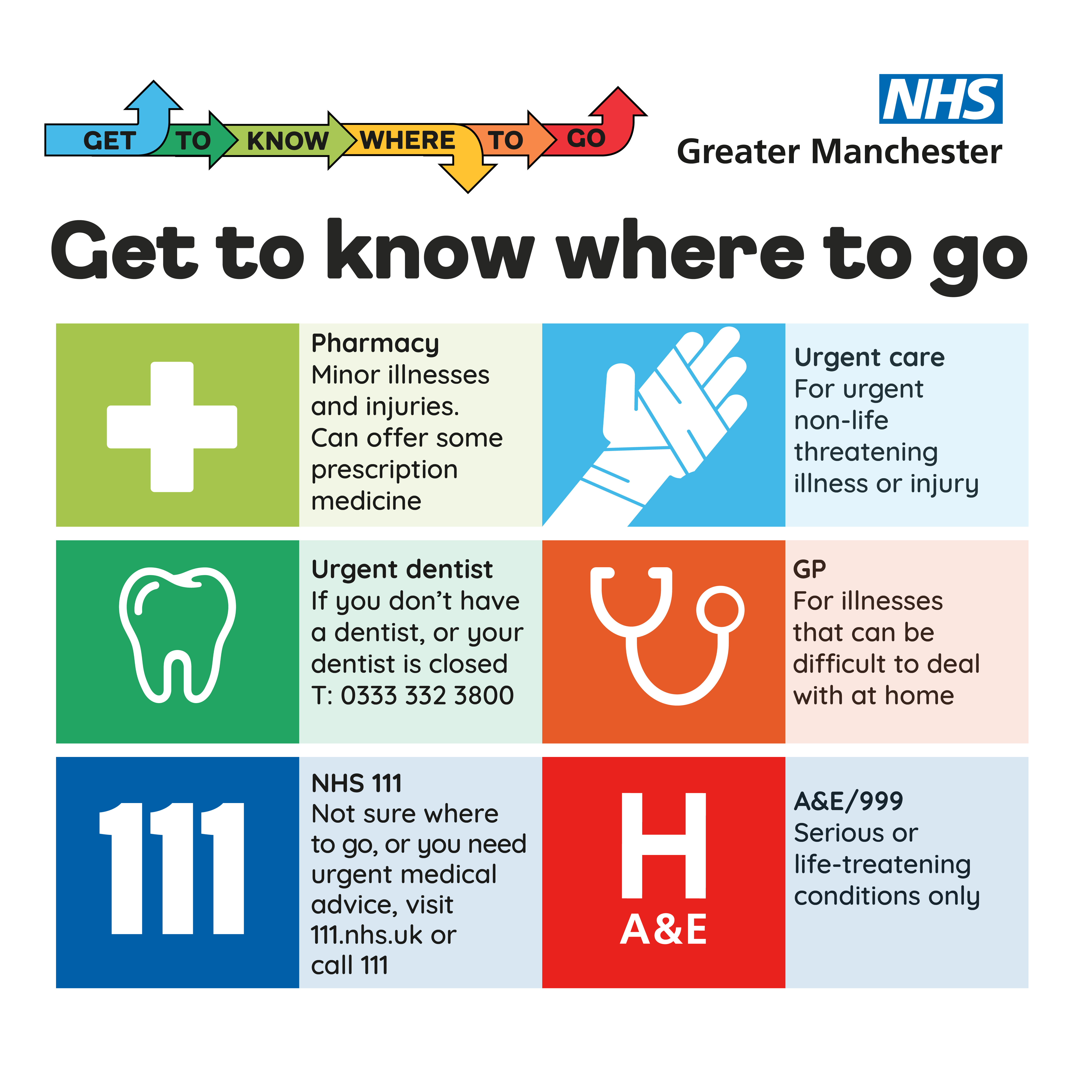Get to know where to go is an initiative by Greater Manchester Integrated Care Partnership to encourage patients to use the right NHS service for their needs, easing the pressure for services such as GP surgeries and Emergency Departments.

When you use the right NHS service, you get the right treatment sooner.
If you become unwell, there are a number of different options available to you:
Self-Care
Many illnesses and minor injuries don’t always need a health professional.
Sometimes rest, lots of water, and over-the-counter medicines from the supermarket or pharmacy, can help your recovery at home.
NHS 111
If you’re not sure what to do or where to go, visit 111.nhs.uk. It’s available 24/7, 365 days a year. You can also call 111 at any time.
You’ll be asked a series of questions about your health problem, and directed to the right service for you.
Mental Health Support
If you’re feeling low, anxious, stressed or overwhelmed, there are lots of things you can do to lift your mood.
You can also self-refer to a number of mental health and wellbeing support services in Greater Manchester and beyond.
If you need urgent mental health support in a crisis, call 0800 953 0285. NHS 111 also has a mental health option.
In a life-threatening emergency, always call 999.
Pharmacy (Chemist)
Pharmacists are healthcare professionals who can give you expert advice on treating minor illnesses and injuries. They can also recommend over-the-counter medicines.
You don’t need an appointment to see a pharmacist, and many are open late or at weekends.
Pharmacists can also help you with questions about your medication and make sure you’re taking it correctly.
Dental Care
If you have pain in your mouth, teeth or gums, you will need to contact a dentist – your GP practice won’t be able to help.
If you do not have a regular dentist, or they are closed, you can call the Greater Manchester Urgent Dental Care Service on 0333 332 3800. This service is available from 8am to 10pm every day, including weekends and bank holidays.
There is an NHS patient charge of £26.80 for each appointment with this service but is free to children.
Optician (Optometrist)
You’ll find a number of different eyecare professionals at your local opticians. They are all eye experts and are there to help keep your eyes healthy. They can also make sure you have the right glasses or contact lenses, if you need them.
Some opticians provide urgent appointments for acute eye conditions that have occurred recently, including flashes, floaters and foreign bodies. Call the opticians before attending, as they will ask you some screening questions and provide some advice prior to booking your appointment.
Many opticians now offer an audiology service, providing hearing tests and fitting hearing aids.
Your GP
Some illnesses or injuries can be difficult to deal with at home, or you may feel you need a bit of help after a few days. You can see other healthcare professionals at your GP practice, not just doctors or nurses. Appointments may be over the phone or face-to-face.
Local GP practices work together to offer evening and weekend appointments. This means you can see a GP, nurse or other healthcare professional at a time that’s convenient for you. Learn more about our GP+ evening and weekend service.
Urgent Care Centre (UTC / ‘Walk-in’)
Urgent Treatment Centres or ‘Walk-in’ centres are there if you need urgent medical help that’s not serious or life-threatening.
Some Emergency Departments may book you an appointment with their urgent care provision if you attend hospital with an issue that is not immediately life-threatening.
Your nearest walk-in centre is Leigh Walk-in Centre – they are open from 7am to 9pm, 7 days a week. Find out more.
There is also a walk-in centre at Trafford General Hospital – they are open from 8am to 8pm, 7 days a week. Find out more.
In a life-threatening emergency, always call 999.
Emergency Department (ED / A&E)
A&E departments (also known as Emergency Departments or Casualty) are there for serious or life-threatening health conditions only. You can visit any Emergency Department near to you, even if you don’t live in the area.
All patients are assessed on arrival at A&E, and people with the most serious conditions will be seen first.
Call 999 if it is an emergency and someone’s life is at risk.
You will be asked some questions to decide if an ambulance is needed. This will not delay their response in a life-threatening emergency, but could provide vital information that will help the ambulance crew.